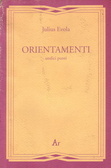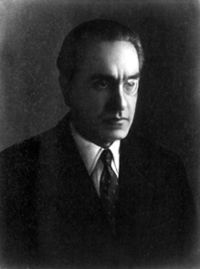
Originally published in 1950, Orientations is a hidden gem among Julius Evola’s impressive body of work. Orientations provides a lucid and concise introduction to Evola’s thought, presenting a framework for the European right-wing to approach the post-war modern world. Evola calls for the creation of a New Man, who will hold himself steady among the ruins of our unmoored civilizations, as they lurch violently towards ever-increasing strife and chaos. He warns against the various trappings of modernity—materialism, bourgeois decadence, contingent economic trivialities, and so on—advising men to embrace the spiritual, heroic, and aristocratic values of the world of Tradition. Evola states that men must lead by example, rise above, and form a new elite, filling the void created by the age of decline and forces of modernity. Orientations is essential reading for all right-wing youth. Other important works by Evola include Revolt Against The Modern World (1934), in which he delineates the concepts of Modernity and Tradition, and Men Among The Ruins (1953), which builds upon the framework laid out in Orientations.
Author

Julius Evola (19 May 1898 – 11 June 1974), born Giulio Cesare Andrea Evola, was an Italian philosopher and esoteric scholar. Born in Rome to a family of the Sicilian landed gentry, Evola was raised a strict Catholic. Despite this, his life was characterised by 'an anti-bourgeois approach' hostile to both 'the dominant tradition of the West—Christianity and Catholicism—and to contemporary civilization—the 'modern world' of democracy and materialism'. By turns 'engineering student, artillery officer, Dadaist poet and painter, journalist, alpinist, scholar, linguist, Orientalist, and political commentator', he has been described as a 'rare example of universality in an age of specialization'. Yet behind it all lay a singular emphasis on, and pursuit of, a 'direct relationship to the Absolute'. For Evola, 'the center of all things was not man, but rather the Transcendent.' This metaphysical conviction can be seen to have determined both Evola's stance on socio-political issues, and his antipathetic attitude towards 'all professional, sentimental and family routines'. The author of many books on esoteric, political and religious topics (including The Hermetic Tradition, The Doctrine of Awakening and Eros and the Mysteries of Love), his best-known work remains Revolt Against the Modern World, a trenchant critique of modern civilisation that has been described as 'the gateway to his thought'. Since his death, also in Rome, his writings have influenced right-wing, reactionary and conservative political thought not only in his native Italy, but throughout continental Europe and, increasingly, the English-speaking world. Nevertheless, he should not be considered primarily as a political thinker, but rather as an exponent of the wider Traditionalist School that encompasses the work of such individuals as René Guénon, Titus Burckhardt and Frithjof Schuon.